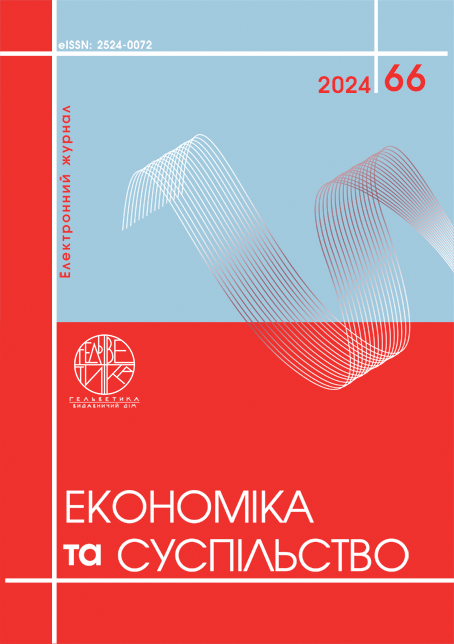THEORETICAL AND METHODOLOGICAL SUPPORT FOR STATE REGULATION OF IMPLEMENTING CIRCULAR ECONOMY MODELS AT THE MICRO-LEVEL
Abstract
This article analyzes the significance of effective state regulation in implementing circular economy models at the micro level to ensure economic, environmental, and social progress in Ukraine. The purpose of the article is systematization of existing approaches and development of theoretical and methodological support for state regulation of the implementation of circular economy models at the micro level, including the substantiation of the mechanism for state regulation of the implementation of circular economy models at the micro level The study justifies clusters of state regulation initiatives for circular transformations: “promoters”, “facilitators” and “activators” which play different roles in regulating circular transformations. Studying of the theoretical foundations of concepts related to state regulation of systemic socio-economic processes has made it possible to determine that when implementing fundamental strategic changes, such as state regulatory initiatives, a specific sequence should be followed. Firstly, the optimization of existing methods of production, distribution, and consumption takes place. Secondly, with the active initiatives of state and local authorities, the transformation of production, distribution, and consumption methods and technologies is supported as a result of changes in the strategic concepts of national economic development. In the third stage of state regulation of transformational circular changes, the facilitation and encouragement of the final departure from traditional linear methods in economic practice occur. The study proposes a mechanism for state regulation of the establishment and development of a circular economy in the agri-food sector, which, unlike existing models. It also includes a unique approach that involves separating the financial-economic mechanism, combining the innovation mechanism with the digital component that will determine the potential and degree of inclusivity in access to innovative scientific developments, startups, projects, and other technological products in the future.
References
The Circular Economy in Cities and Regions: Synthesis Report, OECD Urban Studies, OECD Publishing, Paris. 2020. URL: https://doi.org/10.1787/10ac6ae4-en. (дата звернення: 2 вересня 2024 р.)
Litvak O., Litvak S. Implementation of the circular economy model in the agricultural sector of Ukraine. Baltic Journal of Economic Studies. Vol. 9 No. 2, 2023. DOI:10.30525/2256-0742/2023-9-2-146-156 (дата звернення: 2 вересня 2024 р.)
Страпчук С.І. Система показників оцінки ефективності стратегій циркулярної економіки в аграрному секторі. БІЗНЕСІНФОРМ. 2021, № 9. С. 108-112
Корнієнко Г.С., Шульга М.В. Правові обмеження у сфері обігу земель сільськогосподарського призначення. Аналітично-порівняльне правознавство. 2023. № 5. С. 288-192.
Лупенко Ю. О., Малік М. Й., Булавка О. Г. Стратегічні напрями сталого розвитку сільських територій на період до 2030 року. Київ: ННЦ «ІАЕ», 2020. 60 с.
Нестерова К.С., Куровська І.А. Проблеми та інструменти державної організаційно-економічної підтримки розвитку циркулярної економіки. Економіка АПК. 2021, № 5. С. 57-62
Bibas, R., Chateau J., Lanzi E. Policy scenarios for a transition to a more resource efficient and circular economy. OECD Environment Working Papers. 2021, No. 169 URL: https://doi.org/10.1787/c1f3c8d0-en. (дата звернення: 2 вересня 2024 р.)
Muscat, A., Ripoll-Bosch R., H.H.E. Van Zanten, T.A.P. Metze, C.J.A.M. Termeer, M.K. van Ittersum, I.J.M. de Boer Principles, drivers and opportunities of a circular bioeconomy. Nature Food, 2021. no. 2: p. 561-566. URL: https://doi.org/10.1038/s43016-021-00340-7 (дата звернення: 2 вересня 2024 р.)
Lam, D.P.M., B. Martín-López, A. Wiek, E.M. Bennett, N. Frantzeskaki, A.I. Horcea-Milcu, and D.J. Lang. Scaling the impact of sustainability initiatives: a typology of amplification processes. Urban Transformations, 2020, no. 2. p. 1-24. URL: https://doi.org/10.1186/s42854-020-00007-9 (дата звернення: 2 вересня 2024 р.)
Strapchuk S. Mechanism for ensuring sustainable development of agricultural enterprises on the basis of circular economy. Economic Analysis. 2020, no. 30(2). p. 33-40. DOI: http://dx.doi.org/10.35774/econa2020.02.033 (дата звернення: 2 вересня 2024 р.)
Набока Р.Ю. Механізми державного регулювання формування та розвитку циркулярної економіки. Автореф. дис на здобуття наук ступеня канд наук. Спец. 25.00.02 – механізми державного управління. Харків, 2021. 22с.
OECD (2020), “The Circular Economy in Cities and Regions: Synthesis Report”, OECD Urban Studies, OECD Publishing, Paris, DOI: https://dx.doi.org/10.1787/10ac6ae4-en. (accessed September 2, 2024)
Litvak O., Litvak S. (2023) Implementation of the Circular Economy Model in the Agricultural Sector of Ukraine. Baltic Journal of Economic Studies. Vol. 9 No. 2, 2023. DOI: 10.30525/2256-0742/2023-9-2-146-156 (accessed September 2, 2024)
Strаpchuk S.I. (2021) Sistema pokaznykiv otsinky efektyvnosti stratehii tsykliarnoi ekonomiky v ahrarnomu sektori [System of indicators for evaluating the effectiveness of circular economy strategies in the agricultural sector], BIZNESINFORM, No. 9, pp. 108-112.
Korniienko H.S., Shulha M.V. (2023) Pravovi obmezhenniа u sferі obіgu zemel silskohospodarskoho pryznachennja [Legal restrictions in the sphere of agricultural land circulation]. Analitychno-porivnialne pravoznavstvo, No. 5, pp. 288-192.
Lupenko Yu. O., Malik M. Y., Bulavka O. G. (2020) Strategichni napriamy staloho rozvytku silskykh terytorii na period do 2030 roku [Strategic directions for the sustainable development of rural areas until 2030]. NNC “IAE”, Kyiv, Ukraine, 60 pp.
Nesterova K.S., Kurovska I.A. (2021) Problemy ta instrumenty derzhavnoi orhanizatsiino-ekonomichnoi pidtrymky rozvytku tsykliarnoi ekonomiky [Problems and tools of state organizational and economic support for the development of the circular economy]. Ekonomika APK, No. 5, pp. 57-62.
Bibas, R., Chateau J., Lanzi E. (2021) Policy scenarios for a transition to a more resource efficient and circular economy. OECD Environment Working Papers. No. 169. URL: https://doi.org/10.1787/c1f3c8d0-en. (accessed September 2, 2024)
Muscat, A., Ripoll-Bosch R., H.H.E. Van Zanten, T.A.P. Metze, C.J.A.M. Termeer, M.K. van Ittersum, I.J.M. de Boer. (2021) Principles, drivers and opportunities of a circular bioeconomy. Nature Food. no. 2, pp. 561-566. URL: https://doi.org/10.1038/s43016-021-00340-7 (accessed September 2, 2024)
Lam, D.P.M., B. Martín-López, A. Wiek, E.M. Bennett, N. Frantzeskaki, A.I. Horcea-Milcu, and D.J. Lang. (2020) Scaling the impact of sustainability initiatives: a typology of amplification processes. Urban Transformations, no. 2, pp. 1-24. URL: https://doi.org/10.1186/s42854-020-00007-9 (accessed September 2, 2024)
Strapchuk S. (2020) Mechanism for ensuring sustainable development of agricultural enterprises on the basis of circular economy. Economic Analysis. no. 30(2), pp. 33-40. DOI: http://dx.doi.org/10.35774/econa2020.02.033 (accessed September 2, 2024)
Naboka R.Yu. (2021) Mekhanizmy derzhavnoho rehuliuvannia formuvannia ta rozvytku tsykliarnoi ekonomiky [Mechanisms of state regulation for the formation and development of the circular economy.]. Abstract of dissertation for the degree of PhD: 25.00.02. Kharkiv. 22 pp. (in Ukrainian)


